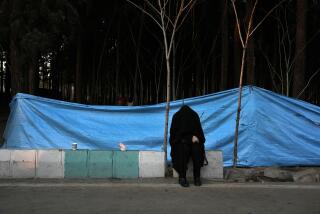Suicide attack kills nearly 50 in western Afghanistan
KABUL, Afghanistan – A suicide bombing and armed attack rocked a government compound in western Afghanistan near Iran on Wednesday, leaving at least 49 people dead, including the nine attackers, and wounding more than 50, officials said.
The attack in Farah, capital of the far-western province with the same name, relied on tactics increasingly seen in attacks on Afghan government targets, analysts said. The approach includes a number of insurgents using stealth, surprise and teamwork to breach the state’s defenses and deliver a message that few areas of the country are beyond their reach.
The assault came as Afghan intelligence chief Asadullah Khalid returned from medical treatment in the United States, some four month after he was badly wounded by a Taliban suicide bomber pretending to be interested in discussing a peace agreement.
Officials said nine men wearing suicide vests arrived at the perimeter of the government complex about 9 a.m. in a Ford Ranger, a type of vehicle used by the Afghan army. This allowed them to pass through area checkpoints without being apprehended, said provincial police chief Agha Noor Kemtoz.
At least seven attackers left the vehicle carrying machine guns and grenades, leaving at least one member behind to detonate the bomb-laden vehicle with himself inside. It wasn’t immediately clear where the ninth attacker deployed.
The explosion in a busy market area of banks and small shops caused extensive damage.
The remaining insurgents then opened fire on police guarding the compound, passing through the gate and headed toward a courthouse, Kemtoz added. Fifteen members of the Taliban were scheduled to face a hearing at the court.
“We’re not sure if it was a real Afghan army vehicle or one painted to look like it,” Kemtoz said. “We’re also not sure if their goal was to free their colleagues or just attack the government compound.”
During the ensuing firefight, which lasted several hours, one insurgent was killed near the gate, Kemtoz said, and at least six others gained entry to government office buildings as civil servants cowered in nearby offices.
It took some six hours before the final insurgent was killed, officials said.
“The attackers made use of machine guns and small arms in the attack,” said Abdul Rahman Zhowandai, spokesman for the governor of Farah province.
Among those killed were four policemen, four Afghan soldiers and an estimated 32 civilians, including a judge and his son, officials said. Most of the wounded were civilians heading to morning court sessions. Several buildings in the compound were damaged by the car bomb, along with two banks.
Wednesday’s attack follows a pattern seen in recent months, said Jawed Kohistani, a Kabul-based military analyst. Even as most attacks in rural areas still involve roadside bombs, a growing number of those in cities employ teams of gunmen and suicide bombers, a break with an earlier reliance on lone suicide bombers.
The use of a coordinated groups, often wearing Afghan uniforms, is an effective response to heightened security around police stations, ministries and other state buildings, Kohistani added, increasing the chance that at least one attacker will penetrate the security cordon.
“This team approach has been very successful in striking coalition and Afghan targets,” he said. “Many of these guys are trained by Pakistan and Al Qaeda. It’s a technique that will continue as long as it proves effective.”
In a telephone interview, Taliban spokesman Qari Yousef Ahmadi claimed responsibility for Wednesday’s attack, adding that 35 were killed and 65 wounded. The attackers were not trained in Pakistan, added Ahmadi, who rejected the idea that Pakistan is interested in influencing and destabilizing Afghanistan before the scheduled 2014 withdrawal of international combat troops.
“Attacking key symbols with teams is part of our new approach, which has been successful,” he said.
Continued violence has weakened confidence in President Hamid Karzai’s government as it assumes more responsibility for the nation’s security. The pending foreign withdrawal has seen growing tension between Karzai’s government and Western governments, particularly the United States.
Afghan Gen. Qadam Shah Shahim told Press TV on Wednesday that he expected most Taliban attacks in 2013 will take place in Kabul against high-profile Afghan and international targets, including United Nations offices, NATO headquarters and embassies.
A statement by the National Directorate of Security said intelligence chief Khalid’s return from the U.S. after the suicide attack last year underscored the agency’s promise to “continue its services day and night bringing security, peace and stability to the nation.”
Khalid, former governor of Ghazni and Kandahar provinces, a close ally of Karzai and a fierce anti-Taliban critic, was named in September 2012 to head the spy agency, which embarked on an aggressive battle against the Taliban.
Though Khalid has been praised by Western officials for his tough stance, and was visited by President Obama in the hospital, he’s come under criticism for alleged corruption while governor of Kandahar, which he denies. The Afghan government has said repeatedly that Khalid will return to his job at the head of the spy agency.
ALSO:
North Korea could stumble from bluster to war
Gaza cease-fire unraveling amid renewed air attacks
Survey: Young Pakistanis harbor doubts about future, democracy
Special correspondent Hashmet Baktash contributed to this report.
More to Read
Start your day right
Sign up for Essential California for news, features and recommendations from the L.A. Times and beyond in your inbox six days a week.
You may occasionally receive promotional content from the Los Angeles Times.






